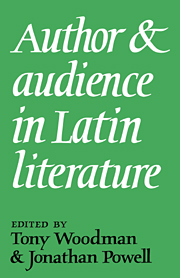Book contents
- Frontmatter
- Contents
- List of contributors
- Prologue
- 1 THE ORATOR AND THE READER: Manipulation and response in Cicero's Fifth Verrine
- 2 STRATAGEMS OF VANITY: Cicero, Ad familiares 5.12 and Pliny's letters
- 3 ‘SHALL I COMPARE THEE…?’: Catullus 68B and the limits of analogy
- 4 ATOMS AND ELEPHANTS: Lucretius 2.522–40
- 5 IN MEMORIAM GALLI: Propertius 1.21
- 6 THE POWER OF IMPLICATION: Horace's invitation to Maecenas (Odes 1.20)
- 7 THE VOICE OF VIRGIL: The pageant of Rome in Aeneid 6
- 8 FROM ORPHEUS TO ASS'S EARS: Ovid, Metamorphoses 10.1–11.193
- 9 POET AND AUDIENCE IN SENECAN TRAGEDY: Phaedra 358–430
- 10 PERSIUS' FIRST SATIRE: A re-examination
- 11 NERO'S ALIEN CAPITAL: Tacitus as paradoxographer (Annals 15.36–7)
- 12 AMOR CLERICALIS
- 13 EPILOGUE
- Notes
- Abbreviations and bibliography
- Indexes
13 - EPILOGUE
Published online by Cambridge University Press: 13 March 2010
- Frontmatter
- Contents
- List of contributors
- Prologue
- 1 THE ORATOR AND THE READER: Manipulation and response in Cicero's Fifth Verrine
- 2 STRATAGEMS OF VANITY: Cicero, Ad familiares 5.12 and Pliny's letters
- 3 ‘SHALL I COMPARE THEE…?’: Catullus 68B and the limits of analogy
- 4 ATOMS AND ELEPHANTS: Lucretius 2.522–40
- 5 IN MEMORIAM GALLI: Propertius 1.21
- 6 THE POWER OF IMPLICATION: Horace's invitation to Maecenas (Odes 1.20)
- 7 THE VOICE OF VIRGIL: The pageant of Rome in Aeneid 6
- 8 FROM ORPHEUS TO ASS'S EARS: Ovid, Metamorphoses 10.1–11.193
- 9 POET AND AUDIENCE IN SENECAN TRAGEDY: Phaedra 358–430
- 10 PERSIUS' FIRST SATIRE: A re-examination
- 11 NERO'S ALIEN CAPITAL: Tacitus as paradoxographer (Annals 15.36–7)
- 12 AMOR CLERICALIS
- 13 EPILOGUE
- Notes
- Abbreviations and bibliography
- Indexes
Summary
Authors and authorship attracted much attention in the ancient world. Alexandrian scholars believed that the wise Homer was incapable of falling below a certain standard of logic or morals, and they would athetise, or condemn as spurious, those lines or passages which seemed to them not to meet that standard. According to Cicero, a true critic was one who (on the basis of internal evidence) could say: ‘Hie uersus Plautinon est, hie est’ (Ad familiares 9.16.4). Famous names tended to attract false attributions, a tendency which itself manifests a belief in the importance of authorship. Examples have come down to us in such collections as the Appendix Vergiliana. Lives were invented for authors about whom little or nothing was otherwise known, and authors themselves thought it worthwhile to advertise their authorship, as did Virgil at the end of the Georgics and Horace at the end of his third book of Odes.
Authors, in their turn, were intensely conscious of their audiences. Aristotle in his Rhetoric (1358b2–4) said that ‘of the three elements in speech-making – speaker, subject and person addressed – it is the last one, the audience, that determines the speech's end and object’. Such statements are not surprising in a society where so large a part was played by oratory in front of live audiences: without a constant awareness of the character of his audience, an orator was unlikely to be successful. But it was not only in the obvious cases of oratory or drama that ancient literature was aimed at a live audience.
- Type
- Chapter
- Information
- Author and Audience in Latin Literature , pp. 204 - 215Publisher: Cambridge University PressPrint publication year: 1992
- 2
- Cited by



